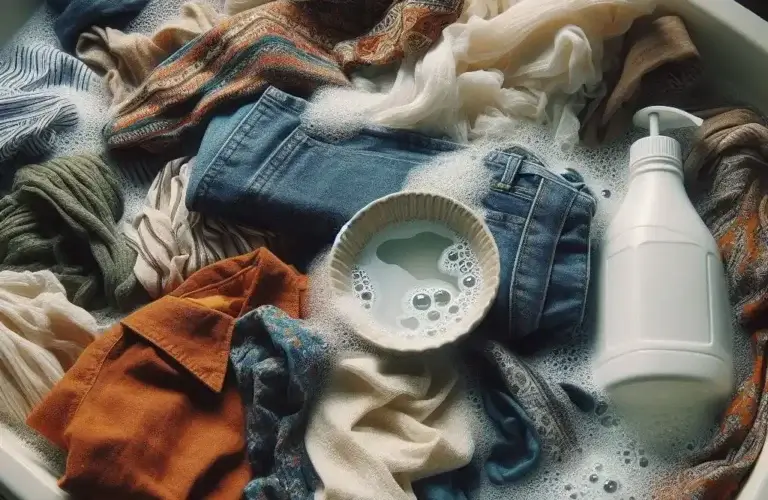Can I Use Body Wash as Laundry Detergent? Answering the Debate
Have you ever found yourself about to do a load of laundry only to realize you’re completely out of laundry detergent? We’ve all been there. When you’re in a pinch, you start looking for desperate solutions to clean your clothes, like can I use body wash as laundry detergent
But is using body wash as a laundry detergent effective? Or could it damage your clothes and washing machine? This article will explore whether or not you can use body wash as a laundry detergent, the pros and cons, and some better alternatives if you ever find yourself without laundry detergent.
Table of Contents
Can You Use Body Wash as Laundry Detergent?
The short answer is yes, you technically can use body wash as a laundry detergent. Body wash, just like laundry detergent, contains surfactants that help lift dirt, oils, and stains from fabric. So in a pinch, squirt some body wash into the drum, and it will create suds to clean your clothes.
However, there are some downsides to using body wash that you should consider:
- Too many suds: Body wash tends to create a lot more suds than laundry detergent. Excessive suds can leave residue on your clothes and even damage your washing machine over time.
- More expensive: Ounce for ounce, body wash costs significantly more than laundry detergent. It’s not economically practical to use body wash long-term for doing laundry.
- Not designed for laundry: While the ingredients may be similar, laundry detergent is specially formulated to get fabrics clean, fight stains, and not damage or fade clothes. Body wash is not designed to do all that.
So while body wash will work in a true emergency when you have no other options, it should not regularly replace laundry detergent. Always use a detergent formulated for washing clothes in your laundry routine for best results.
Better Alternatives When You’re Out of Laundry Detergent
While body wash will technically work, there are some better homemade alternatives you can mix up if you ever run out of laundry detergent and need to wash clothes right away:
Baking Soda and Vinegar
Baking soda is a mild abrasive that will lift dirt from fabric, while vinegar kills odor and acts as a fabric softener. Mix together:
- 1 cup baking soda
- 1 cup white vinegar
- 1⁄2 cup warm water
Add the mixture right to your washing machine drum at the start of the wash cycle. The baking soda and vinegar will work together to clean clothes without creating excess suds.
Bar Soap and Borax
Grate a few bars of soap into flakes then mix with borax and washing soda to make your own laundry detergent:
- 4 cups hot water
- 1 cup soap flakes
- 1⁄2 cup borax
- 1⁄2 cup washing soda
Allow it to cool and use 1⁄2 cup per load. The natural cleaning power of soap combined with the stain-fighting oxy power of borax gets clothes clean and fresh.
Castile Soap
Castile soap is made from plant oils like coconut, olive, jojoba or hemp oil. It’s biodegradable and far gentler on skin than typical body washes. Mix up your own natural liquid laundry detergent:
- 3 cups water
- 1⁄3 cup Castile soap
- 15-20 drops essential oil (optional)
Add 1⁄2 cup to your washing machine drum per regular load. Castile soap naturally cuts through grease and dirt without chemicals. The essential oils add a light fresh scent.
Can I Use Body Wash as Laundry Detergent? Solution

We’ve all been there. The laundry basket overflowing, the washing machine humming away, and… oh no, the laundry detergent is empty! In a pinch, you might reach for the nearest sudsy solution – body wash. But before you toss that shower gel in with your dirty socks, let’s untangle the truth about using body wash as laundry detergent.
The Short Answer: Not Ideal, But Maybe in a Pinch
While body wash can technically create suds and clean your clothes in a very basic way, it’s far from the ideal laundry solution. Here’s why:
- Missing key ingredients: Laundry detergent is formulated to tackle tough stains, fight odors, and soften fabrics. Body wash lacks the enzymes, brighteners, and softeners needed for effective laundry cleaning.
- Excessive suds: Body wash is designed to lather up on your skin, which can be a nightmare for your washing machine. Excessive suds can clog dispensers, overflow, and even damage your machine’s internal components.
- Residue buildup: Body wash isn’t designed to rinse out as easily as laundry detergent. This can leave behind residue on your clothes, attracting dirt and causing stiffness.
- Fabric damage: Some body washes contain ingredients like moisturizers or fragrances that can harm delicate fabrics or cause discoloration.
So, when is it okay to use body wash for laundry?
Only as a last resort for a small load of lightly soiled clothes. Think delicates you hand-wash anyway or workout gear that needs a quick refresh. Even then, proceed with caution:
- Use a gentle, fragrance-free formula.
- Skip the washing machine and hand-wash instead.
- Use a very small amount, like a teaspoon.
- Rinse thoroughly to avoid residue.
Remember, body wash is not a substitute for real laundry detergent. It’s a temporary fix, not a long-term solution.
Better Alternatives for Laundry Emergencies:
- Dish soap: A small amount of dish soap can be surprisingly effective for greasy stains.
- Baking soda: This natural deodorizer can help freshen clothes and remove light stains.
- Shampoo: Gentle, fragrance-free shampoo can be used in a pinch for delicates.
- Bar soap: Grated bar soap can be used for hand-washing small loads.
Investing in a good quality laundry detergent is always the best bet for clean, fresh, and damage-free clothes
When to Avoid Using Body Wash on Laundry

While body wash will work in a pinch if you have absolutely no other alternative, there are a few situations where you should avoid using it as laundry detergent:
- Delicates: Bras, silks, satins, wool items, etc. should not be washed with body wash. The extra suds can damage delicate fabrics. Stick to a gentle detergent made specifically for delicates.
- Heavily soiled items: Body wash won’t have the same cleaning power as laundry detergent on very dirty items like sports uniforms, grease-stained clothes, etc. The grime may not fully wash out with body wash.
- New clothes: Many new brightly colored items bleed a lot of dye when they are first washed. The dyes can stain other items in the load. Body wash won’t have the same dye transfer inhibiting abilities as laundry detergent.
- Cold water only: Body wash doesn’t dissolve as readily in cold water. So if you have a cold water only washing machine, the body wash may leave a filmy residue.
Essentially any situation where getting fabrics completely clean and residue-free is crucial, avoid using body wash and opt for true laundry detergent instead.
Step-By-Step Guide to Washing With Body Wash
If you do need to use body wash in an emergency situation, follow these steps:
- Read labels first: Not all body washes are created equal. Avoid using ones with beads, glitter or other additives that could get stuck in fabric fibers. Choose a basic inexpensive body wash.
- Use less than detergent: Start with about 1⁄4 cup for a regular load (equivalent to 2-3 tablespoons). Too much will create excessive suds.
- Wait for suds to dissolve: Before adding clothes, let suds dissolve for a few minutes on the first cycle with the washing machine filled with water. This prevents excess suds.
- Use cool or warm water: Hot water creates even more suds with body wash. Stick to cooler temperatures.
- Extra rinse cycle: Make sure to add an extra rinse cycle after washing to remove any soapy residue.
- Clean washing machine: Run a sanitize cycle on your washing machine after to remove any buildup from minerals in the body wash.
Follow these tips, and you can get through a laundry emergency using body wash if needed without ruining clothes or your machine. But for everyday loads, always reach for true laundry detergent instead for best results.
FAQs: Using Body Wash for Laundry
Still, have some questions about using body wash as laundry detergent? Here are answers to some of the most common questions:
Can I use hand soap instead of laundry detergent?
Technically yes, but it’s very similar to body wash and has the same downsides like excess suds. Unless you have absolutely no other alternative, avoid using a bar or liquid hand soap on laundry.
Should I use body wash on hand-washed clothes?
No – hand washing is for delicate fabrics, and body wash would create far too many suds making it hard to properly rinse out the garments. Use a gentle cleanser made for hand-washing delicates.
Can I mix body wash with vinegar and baking soda?
It’s best not to mix body wash with other homemade cleaners. Body wash already creates abundant suds on its own. Adding extra cleaning agents could result in soap buildup in fabric fibers and difficulty rinsing.
How much body wash should I use in HE washers?
For front-loading high-efficiency washers, limit body wash to 1-2 tablespoons per load. HE machines are susceptible to suds buildup and using too much body wash can easily create overflow issues. Always run an extra rinse cycle after washing.
Will washing with body wash damage my washing machine?
Over time, yes it potentially could. Residue from certain ingredients may build up causing odors or mold growth. Regularly running the sanitize or tub clean cycle can help prevent damage, along with avoiding frequent use of body wash detergent alternatives.
The Bottom Line
Being able to throw in a load of laundry at a moment’s notice is essential. So while using body wash as laundry detergent may work decently well once or twice in a true pinch, it’s best reserved for emergencies only. The excess suds, cost, and formulation make true laundry detergent a better option for getting your clothes fresh and clean. But if you ever get caught off guard without detergent on laundry day, body wash can safely get you through in a bind when used properly.








